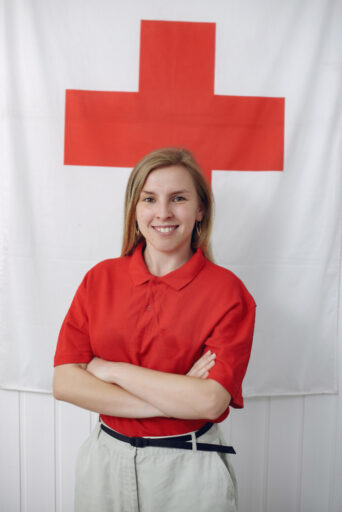You can invest if you work overseas for the Red Cross by maintaining your home-country investment accounts, using offshore or international platforms, and ensuring compliance with tax and reporting rules across jurisdictions.
Since Red Cross staff often work in multiple countries, the main challenge lies in managing access to financial services, tracking residency-based taxation, and upholding ethical investment standards that align with humanitarian principles.
While investing back home is generally possible, many staff find offshore or international investments advantageous for diversification, easier access, and greater flexibility while working abroad.
This article explores:
- How to manage tax residency and compliance as Red Cross workers abroad
- The best investment options for humanitarian and NGO professionals
- Ethical investments for Red Cross workers
- Challenges of Red Cross workers investing abroad
- Financial planning tips for Red Cross
Key Takeaways:
- Red Cross staff can invest through home-country, offshore, or online platforms.
- Tax residency determines how investment income must be declared.
- Ethical and conflict-of-interest rules may shape investment decisions.
- Working with expat financial advisors can simplify compliance and planning.
My contact details are hello@adamfayed.com and WhatsApp +44-7393-450-837 if you have any questions.
The information in this article is for general guidance only. It does not constitute financial, legal, or tax advice, and is not a recommendation or solicitation to invest. Some facts may have changed since the time of writing.

What is Red Cross and its Purpose?
The Red Cross is a global humanitarian movement dedicated to alleviating human suffering and protecting life and dignity during crises.
It operates through three main components:
- National Red Cross and Red Crescent Societies, such as the American Red Cross or Philippine Red Cross, which carry out humanitarian activities within their countries.
- The International Committee of the Red Cross (ICRC), which focuses on protecting victims of armed conflict and promoting international humanitarian law.
- The International Federation of Red Cross and Red Crescent Societies (IFRC), which coordinates relief efforts during natural disasters and supports development and capacity-building among national societies.
Its core purposes include:
- Providing emergency aid during conflicts and natural disasters
- Supporting healthcare, refugee assistance, and disaster preparedness
- Promoting neutrality, independence, and impartiality in humanitarian operations
Because of this international presence, many Red Cross workers spend years abroad, making it essential to understand how to manage and invest their income responsibly across borders.
Can You Invest if You Work Overseas for the Red Cross?
Yes. There are no general restrictions that prohibit Red Cross staff or volunteers from investing while overseas.
However, your ability to invest depends on your employment status, country of residence, and access to financial platforms.
Most investment restrictions relate to logistics and compliance, not the organization itself.
For example, some postings in developing or sanctioned countries may limit access to international banking or trading platforms, but the Red Cross itself does not ban personal investment.
Understanding Your Employment and Tax Residency Status
Your investment options are determined by your home country’s tax regulations and the terms of your employment contract.
Red Cross personnel are typically employed by national societies, meaning your tax obligations stay tied to your country of citizenship or permanent residence.
For instance:
- US citizens remain subject to IRS reporting and global income taxation, even when working overseas.
- UK nationals may qualify for non-resident tax status depending on their length of assignment.
- EU or Commonwealth expats may have tax treaties or exemptions that affect investment income.
Understanding your tax residency helps you determine where to open investment accounts and how to declare returns legally.
What Are Common Investment Options for Red Cross Workers Overseas?

Red Cross workers overseas can invest through home-country accounts or offshore platforms that offer global access.
These options provide flexibility and stability across postings, including:
1. Home-Country Investments
Keeping your investments in your home country ensures regulatory familiarity and easier management, especially if you plan to retire or resettle there.
Common options include:
- Mutual funds or ETFs, which provide diversified exposure and professional fund management.
- Retirement accounts such as 401(k), IRA, or national pension schemes, offering tax benefits and long-term security.
- Real estate in stable jurisdictions, which can generate rental income or serve as a personal residence in the future.
2. Offshore Investment Accounts
For those frequently reassigned to different countries, international brokerage or offshore accounts allow flexibility and uninterrupted access to investments.
These accounts typically support multi-currency holdings, global stock or fund trading, and easy consolidation of savings earned across postings.
3. Robo-Advisors and Automatic Plans
Digital platforms such as robo-advisors can manage investments automatically, ideal for humanitarian workers with unpredictable schedules.
They rebalance your portfolio, reinvest dividends, and ensure steady contributions even when you’re deployed in remote or high-demand regions.
Step-by-Step: How to Invest if You Work Overseas for the Red Cross
You can invest while working overseas for the Red Cross by following a clear process that starts with checking your employment rules and ends with reviewing your portfolio regularly.
Here’s how to do it step by step:
1. Check your contract and employer rules
Confirm that your role allows outside investments and that no conflict-of-interest applies. When unsure, ask HR for written clarification.
2. Determine your tax residency
Identify which country you’re a tax resident of and understand reporting rules like FATCA (for US citizens) or CRS (for most others).
These affect how you declare investment income.
3. Choose where to hold your investments
Decide between home-country accounts, offshore platforms, or both.
-Home-country accounts offer familiarity and easier pension access.
-Offshore platforms provide flexibility for frequent relocations.
4. Set up accounts and verify documents
Prepare your passport, proof of address, and employment details. Enable secure online access and two-factor authentication.
5. Build an emergency fund first
Save at least 3–6 months of living expenses in a stable currency before investing.
6. Pick suitable investment vehicles
Choose low-maintenance, diversified options like ETFs, global mutual funds, or ESG portfolios that align with Red Cross values.
7. Automate and track your investments
Set up monthly contributions and automatic rebalancing through your broker or robo-advisor to stay consistent.
8. Keep clear records and stay compliant
Maintain transaction logs, file tax reports, and meet your employer’s disclosure rules.
9. Protect beneficiaries and access
Update beneficiary designations and store login credentials securely.
10. Review regularly
Reassess your portfolio and tax situation yearly or before moving to a new post.
Do I Have to Pay Tax on Overseas Investments?
Yes. Even if you work overseas for the Red Cross, investment income is generally taxable according to your home-country laws.
Your salary might be paid locally or through your national Red Cross branch, but investment gains such as dividends, interest, or capital gains are generally taxable in your country of tax residence.
Key international tax and reporting frameworks to be aware of include:
- FATCA (Foreign Account Tax Compliance Act): Applies to US citizens and residents, requiring them to report all foreign financial accounts and investment income to the IRS.
- CRS (Common Reporting Standard): Adopted by most countries to automatically exchange financial data between tax authorities, ensuring transparency on offshore holdings.
- Foreign Earned Income Exclusion (FEIE): Allows US expats to exclude a portion of their foreign salary from taxable income, though it does not exempt investment earnings such as dividends or capital gains.
Because each Red Cross posting can place you in different jurisdictions, tax obligations can vary.
It’s best to consult a tax advisor experienced in expat or NGO taxation to remain compliant in both your home and host countries.
What Are Ethical Considerations in Investment for Red Cross Workers Overseas?
Red Cross workers should ensure their investments align with the organization’s humanitarian values by avoiding sectors or companies that conflict with its principles of neutrality, independence, and impartiality.
While the Red Cross does not ban personal investing, maintaining ethical and transparent financial practices is essential to preserving trust and integrity in humanitarian work.
It’s best to avoid investing in:
- Defense or arms manufacturing companies, as these may directly conflict with humanitarian relief objectives.
- Firms involved in resource exploitation or conflict-driven industries, particularly in regions where the Red Cross operates.
- Businesses with poor human rights or environmental records, which contradict the movement’s mission of protecting life and dignity.
Many Red Cross professionals instead choose ethical, ESG-focused, or impact investments, which prioritize environmental, social, and governance standards.
These options allow you to build wealth responsibly while ensuring your portfolio supports the same humanitarian principles that guide your career.
What Challenges Do Red Cross Workers Face When Investing Abroad?
Red Cross workers often face financial and logistical challenges when investing overseas due to their mobile assignments and the complex environments where they operate.
Frequent relocations, inconsistent access to banking services, and varying local regulations can all make managing investments more complicated than it is for typical expatriates.
Common challenges include:
- Limited banking access: Some field postings are in countries with underdeveloped or unstable banking systems, making it difficult to open or manage investment accounts.
- Currency volatility: Earnings and savings may fluctuate in value due to exchange rate swings, especially when paid in local currencies that are prone to devaluation.
- Transfer restrictions: In sanctioned or conflict-affected regions, transferring funds across borders can be delayed or restricted by both local and international financial regulations.
- Frequent relocation: Constant reassignment can disrupt long-term investment plans and make it harder to maintain consistent contributions.
To manage these challenges, many humanitarian professionals maintain accounts in stable financial centers such as Singapore or Switzerland, open multi-currency accounts, and rely on global online investment platforms that offer access and flexibility from anywhere in the world.
Financial Planning Tips for Red Cross and NGO Professionals
Red Cross and NGO professionals can strengthen their financial security by building flexibility into their plans and protecting income earned across multiple countries.
Since postings often change, proper planning helps maintain stability despite relocations or varying local economies.
Key financial planning tips include:
- Maintain an emergency fund in a strong currency such as USD, EUR, or CHF to safeguard against local currency depreciation or sudden evacuations.
- Diversify investments across regions and asset types to reduce exposure to geopolitical or market risks.
- Avoid concentrating assets in one country to protect against legal or tax complications tied to a single jurisdiction.
- Review insurance and retirement plans regularly to ensure they remain valid and aligned with your current posting.
- Consult financial advisors familiar with expat finance and NGO contracts to optimize tax efficiency and manage cross-border income properly.
Conclusion
Working overseas for the Red Cross doesn’t mean setting aside your financial goals.
You can—and should—invest to secure your future while continuing your humanitarian mission.
The key is maintaining ethical, compliant, and flexible financial habits that adapt to the realities of global work.
By understanding your tax residency, choosing accessible investment platforms, and aligning your portfolio with your values, you can make your service sustainable both personally and financially.
FAQs
What are the benefits of Red Cross membership?
Members support humanitarian efforts and gain access to first aid training, insurance coverage during Red Cross activities, and priority assistance in emergencies.
What is the source of income for the Red Cross?
The Red Cross is funded through donations, membership fees, fundraising events, grants, and services like blood programs and training.
Is Red Cross under government?
No. The Red Cross is an independent, humanitarian organization officially recognized by the government but not controlled by it.
Pained by financial indecision?

Adam is an internationally recognised author on financial matters with over 830million answer views on Quora, a widely sold book on Amazon, and a contributor on Forbes.



